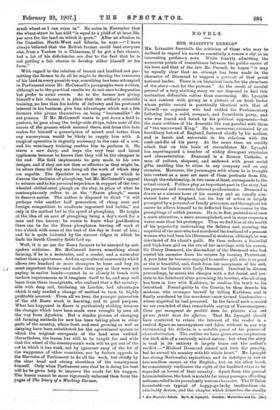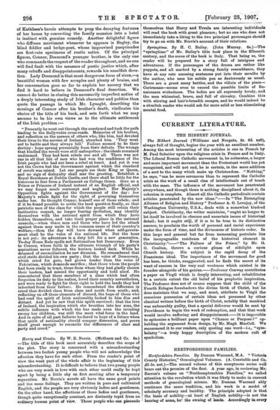NOVELS.
HER MAJESTY'S REBELS.•
Ma. Lvaionr forestalls the criticism of those who may be inclined to regard his novel as essentially a roman d clef in an interesting prefatory note. While frankly admitting the numerous points of resemblance between the public career of his hero and that of the late Mr. Parnell, he hopes " it may be equally clear that no attempt has been made in the character of Desmond to suggest a portrait of that great national leader. There is an historical basis for the structure of the story—not for the persons." As the result of careful perusal of a very striking story we are disposed to find this contention defensible rather than convincing. Mr. Lysaght is not content with giving us a picture of an Irish leader whose public record is practically identical with that of Parnell—an organiser who had welded his Parliamentary following into a solid, compact, and formidable party, and who was feared and hated by his political opponents—but the main outlines of his domestic life run parallel with those of " the uncrowned King." He is, moreover, animated by an hereditary hatred of England, fostered chiefly by his mother, and is harsh and autocratic in his relations with the rank-and-file of his party. At the same time, we readily admit that on this basis of resemblance Mr. Lysaght has superimposed a number of widely divergent attributes and characteristics. Desmond is a Roman Catholic, man of oulture, eloquent, and endowed with great social gifts, enabling him to shine in any company and on any occasion. Moreover, the personages with whom he is brought into contact as a man are none of them portraits from life, though the relationship, in two cases at least, corresponds to the actual record. Politics play an important part in the story, but the personal and romantic interest predominates. Desmond is drawn as a sincere lover of his country and an equally con- sistent hater of England, but hie line of action is largely prompted by a personal or family grievance, and throughout his career he allows himself to be deflected from his course by the promptings of selfish passion. He is, in fine, painted as at once a more attractive, a more accomplished, and in some respects a worse man than his prototype. Thus we find him at the zenith of his popularity undertaking the defence and securing the acquittal of the man who had murdered the husband of a peasant woman who had been his (Desmond's) mistress, although he was convinced of his client's guilt. He then seduces a beautiful and high-born girl on the eve of her marriage with his cousin, Sir Henry Desmond, the descendant of the Desmond who had ousted his ancestor from his estates by turning Protestant. A year later• he becomes engaged to another girl, who is as good as she is beautiful, and, fresh from her acceptance of his suit, resumes his liaison with Lady Desmond. Involved in divorce proceedings, be meets the charges with a flat denial, and per- sists in his falsehood after promising his brother, who all along has been in love with Kathleen, to confess the truth to his betrothed. Found guilty in the Courts, he then deserts his mistress, who revenges herself by telling Kathleen, and is finally murdered by the murderer—now turned whose acquittal he had procured. In the face of such a record we are reminded of that remarkable saying of Vauveuargues Ceux qui mangusni de probitg dans lea plaisirs teen eel qteune feinte dans lea afaires. That Mr. Lysaght should have contrived to retain the interest of the reader in a central figure so unscrupulous and false, without in any way extenuating his defects, is a notable proof of his powers of characterisation. The outline we have given above emphasises the dark side of xi. curiously mixed nature; but when the story is read in its entirety it largely bears out the author's verdict :—" Michael Desmond sinned and bore the penalty, but he served his country with his whole heart." Mr. Lysaght has strong Nationalist aspirations, and be indulges in one or two needless sneers at the English ; hut, on the other hand, he consistently vindicates the right of the landlord class to be regarded as lovers of their country. Apart from this general fairmindedneas, the book is notable for many passages affording welcome relief to its prevalently serious character. The O'Brien household—eo typical of happy-go-lucky landlordism—is admirably drawn, and the chapter which describes the results • Her Majesty's R.hls, By S. E. lough*. .London Nsomtilso sad Co. Os.] of Kathleen's heroic attempts to prop the decaying fortunes of her house by converting the family mansion into a hotel is instinct with genuine comedy. Another delightful figure who diffuses merriment whenever he appears is Begley, the blind fiddler and hedge-poet, whose improvised pasquinade° are first-rate specimens of rustic satire. Of the principal figures, Connor, Desmond's younger brother, is the only one who commands the respect of the reader throughout, and no one will find fault with the measure of poetic justice which, after many rebuffs and disappointments, rewards his unselfish devo- tion. Lady Desmond is that most dangerous form of siren,—a beautiful woman with few scruples and plenty of brains, and her conversation goes so far to explain her sorcery that we find it hard to believe in Desmond's final desertion. We cannot do better in closing this necessarily imperfect notice of a deeply interesting study of Irish character and politics than quote the passage in which Mr. Lysaght, describing the musings of Connor after his brother's death, vindicates his choice of the title of his book, and sets forth what we may assume to be his own views as to the ultimate settlement of the Irish problem:— "Presently he went out through the courtyard and took the path leading to the Ballyvodra cross-roads. Memories of his brother, and reflection on the careers of others who, like him, had devoted' their lives to the service of Ireland, absorbed him. ' They went out to battle and they always fell.' Failure seemed to be their destiny : hope sprung perennially from their defeats. The wrongs that kindled the revolt were still unforgotten : the ideals remained undimmed. They had been rebels one and all. There was not one in all that list of men who had won the confidence of the Irish people who had not been a rebel at heart. And yet it was not the Crown but the Government against which the standard of revolt was raised. Let our people see their Ring or Queen, and no sign of disloyalty shall mar the greeting. Establish a Royal Residence at Dublin Castle, and there shall be little for the timorous to fear from a Parliament on College Green. Give us a Prince or Princess of Ireland instead of an English official, and we may forget much contempt and neglect. Her Majesty's Opposition fights against the Government of the day : her Majesty's rebels fight for the right of governing themselves under her. So thought Connor, himself one of those rebels; and if it be found possible to settle the land question finally, so that patriotic men of the class for which the people still retain their instinctive respect, no longer fearing spoliation, may identify themselves with the national spirit from which they have hidden themselves, and take their proper place in the national councils,—when these men and those who have led the attack against them may unite in the common cause of their country's welfare,—then the day will have dawned when self-govern- ment shall be the voice of the national life. But the hour is not yet : its adventure is a duty left for a new generation. To-day Home Rule spells not Nationalism but Democracy. Even to Connor, whose faith in the ultimate triumph of his party's aspirations never faltered, the horizon looked dark. While he dreamed of reconciliation he saw disunion. He remembered that civil strife divided his own party ; that the voice of Democracy, which cried for gain, had grown louder than the voice of Patriotism, which demands sacrifice ; that those whom the people had been ready to trust, those from whom they had gladly chosen their leaders, had missed the opportunity and held aloof. He remembered that these members of a class which had often forgotten its duty to the nation, loved their country nevertheless, and were ready to fight for their right to bold the lands they had inherited from their fathers. He remembered the difference in creed that divided class from class and north from south ; and, reflecting on all these elements of discord, the hope of those who had read the spirit of Irish nationality looked to him dim and distant. And yet he saw that this spirit survived : that the love of Ireland, the inspiration which she breathes into her sons, the subtle influence with which she has made even the invading enemy her children, was still the most vital force in the land. And in spite of all past failures he dared to hope of a future when that spirit of nationality should conquer dissension, and prove itself great enough to reconcile the differences of class and party and creed."











































 Previous page
Previous page